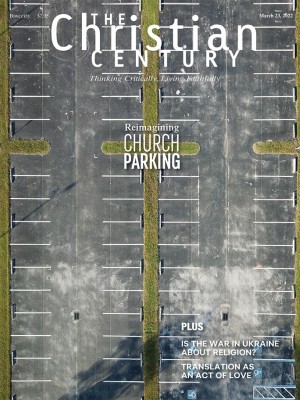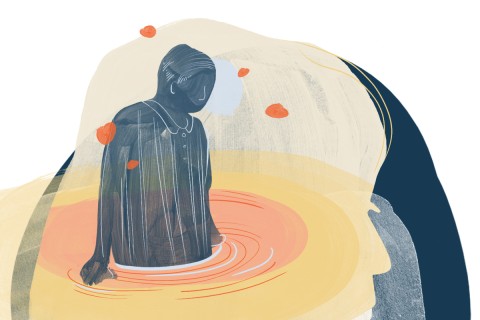Ukrainian-American Jews pray, wait for news
Following news of the Russian invasion of Ukraine has been scary in a personal way for Rabbi Menachem Shemtov and his wife, Racheli. Racheli grew up in Kyiv, where her father, Rabbi Jonathan Markovitch, is referred to as chief rabbi. Markovitch and his family had the opportunity to leave recently but chose to stay.
“They felt it was their duty to be there for their community,” said Shemtov, the director of Chabad Georgetown in Washington, DC.
Markovitch has kept his synagogue, the Kyiv Jewish Center, open and is trying to stock as many necessities—flour, water, sleeping bags, mattresses, and clothing—as possible. He has no way of knowing whether supply chains will hold or when the situation could deteriorate further.
Read our latest issue or browse back issues.
According to Shemtov, Ukraine’s tens of thousands of Jews do not feel especially vulnerable as Jews, but he notes that history has taught Jews to be on high alert amid regional or global instability.
He said, in times of danger, Jews adopt a three-pronged response: “Torah, tefillah (prayer), and tzedakah (charity).” That means directing attention to those in jeopardy while studying sacred texts, praying—particularly Psalm 130 and Psalm 20, both of which address danger—and donating to help those who are in need.
Kyiv’s Jewish community requires tens of thousands of dollars to meet basic needs and stay as safe and comfortable as possible, said Shemtov, who directs those who want to help to the website careforkiev.com. So far, more than $108,000 has been raised.
Nicole Krishtul is the first member of her family to be born in the United States. Her family comes from Mohyliv-Podilskyi. Krishtul has witnessed many Ukrainian Jews in the United States worrying about friends and family back home, and a friend in Ukraine texted Krishtul’s mother at 1 a.m. alerting her that the war had started.
“I can’t wrap my head around the fact that Putin justifies his invasion as the ‘de-Nazification’ of Ukraine, which has a Jewish president who lost family during the Holocaust,” she said. “I highly doubt any Ukrainian Jew would have asked for this.”
Krishtul cautions those who want to help to beware of scams, which can surface during trying times to prey on the generous. American Jews can help by contacting federal elected officials and urging them to expedite the acceptance of Ukrainian refugees, she said. They can also push for funds to provide housing, services, and other kinds of support.
“In 1987, American Jews marched in Washington, DC, to allow my family to come here,” she said. “I hope we can do the same again.”
Aaron Parnas, a lawyer in Miami, has an aunt, uncle, and young niece living in Kyiv. The rest of his family emigrated to the United States in the last 40 years. With reports that able-bodied men ages 18 to 60 cannot leave the country, Parnas said his uncle, 57, cannot leave. The three tried to flee the country before the invasion, but the roads were blocked.
Parnas is in touch with his family in Kyiv every day or two. He said they are safe, hunkering down at home, and they have what they need for now. “It’s scary, because they don’t know what’s to come,” he said.
Supply chains have been tenuous in Ukraine ever since Russia’s 2014 annexation of Crimea, and the pandemic had already eroded them further, said Parnas, noting, “This will only exacerbate the issue.”
His relatives’ message for those who are following developments from abroad is not to trust Russian propaganda. Parnas, too, advises the generous to be cautious and to vet any organizations purporting to help Ukrainians.
With corruption in the country and near-continuous air strikes, he is skeptical that many can actually deliver direct aid now. His local Jewish federation in Miami has been collecting money and conducting a food drive, and he recommends that other American Jews who want to help be in touch with their local federation.
Amid everything, Parnas’s relatives in Kyiv are hopeful, and everyone is praying. “They just want this to be over,” he said. —Religion News Service




